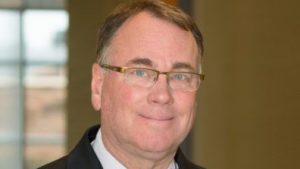Elson S. Floyd College of Medicine at WSU
James Zimmerman
Vice Dean, Administration, Accreditation and Finance Washington State University, Elson S. Floyd College of Medicine
Scribe: Sam Peterson Editor: Bob Holert Introduced by: Kit Bowerman
Logged In =
Create =
Manage =

President Chris Boland called the meeting to order at 730 AM and then Sam Peterson led the invocation and pledge. Andrew Face next introduced visiting Rotarians and guests.
Tanya Franzen-Garrett introduced our May Student of the Month from Sammamish High School, Kasumi Sato. Joining us were her parents as well as her Sammamish High School counselor, Maureen Travaille. Maureen has been a big help to our Student of the Month program over the years and we thank her for that!
The Interact Club at Forest Ridge has been extremely active, both helping us with our All in For Autism event while also doing their own projects. The new officers for the club joined us, introduced themselves and discussed their roles. In addition, Caitlin Devaney also recognized the scholarship recipients form the Interact Club.
Jason Cherney, Community Service Director discussed the committees that comprise the Community Service arm of BBRC. These include the Adoption Party, Major Grants, Preserve Planet Earth, Rotary First Harvest and Service Projects. Jason also discussed the Tavon Center service project held the following day, June 1.
Carmela Ramaglia, BBRC’s Sergeant of Arms and Minister of Fun, raised some “Happy Bucks” and then reminded us all that Rotating the Wheels is Saturday night, June 29 at Newport Shores Yacht Club. Get your tickets so you can get the best value while celebrating both this Rotary year (2018-19) and next (2019-20)!
Jim Zimmerman, Vice Dean of Administration, Accreditation and Finance of the Elson S. Floyd College of Medicine was our speaker, accompanied by Nancy Fike, Senior Development Director. Jim and Nancy joined us to give an update on the progress of this new medical school at Washington State Unviersity, whose mission is health and wellness. Washington State University is a land grant university and the new medical school, headquartered in Spokane, also has regional locations in Vancouver, Everett and the Tri-Cities.
The curriculum includes nursing, pharmacy and health sciences with an emphasis on working in teams, the future of health care. This curriculum involves research, investigation and discovery from soil to society. Specifically, areas of study include: addiction; neuroscience (Steve Gleason Foundation teaming with the medical school for research); nutrition and exercise physiology; speech and hearing sciences; nursing; pharmacy; and biomedical and genetics. In the last 2 years, the college of medicine has added $30 million in grants for research, which will help drive the growth.
The medical school class size will be 60 per year thru 2022. In 2023, the class size will increase to 80. These classes are comprised of students who live in or have a significant background to Washington, with the emphasis on serving smaller communities. Entrance requirements have been expanded and the classes are diverse in a variety of ways – age, ethnicity, background. Service learning is also an emphasis, where the students work with clinics across the state. That is the result of having multiple locations in the state and working in conjunction with local health care leaders at or near those locations. Part of the curriculum and training requires the students to create an implement service-learning projects. The school presently works with 80 clinical partners and they serve as defacto faculty, helping train the students. As a conclusion. Jim pointed out how the Elson S. Floyd College of Medicine infrastructure in research and medical education has created value for the state and will help be a growth driver across the state.